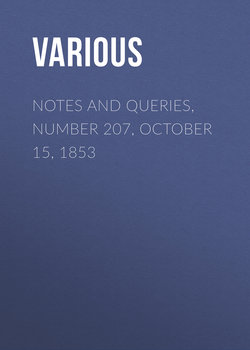Читать книгу Notes and Queries, Number 207, October 15, 1853 - Various - Страница 8
Minor Notes
ОглавлениеOn a "Custom of ye Englyshe."—When a more than ordinarily doubtful matter is offered us for credence, we are apt to inquire of the teller if he "sees any green" in our optics, accompanying the query by an elevation of the right eyelid with the forefinger. Now, regarding this merely as a "fast" custom, I marvelled greatly at finding a similar action noted by worthy Master Blunt, as conveying to his mind an analogous meaning. I can scarcely credit its antiquity; but what other meaning can I understand from the episode he relates? He had been trying to pass himself off as a native, but—
"The third day, in the morning, I, prying up and down alone, met a Turke, who, in Italian, told me—Ah! are you an Englishman, and with a kind of malicious posture laying his forefinger under his eye, methought he had the lookes of a designe."—Voyage in the Levant, performed by Mr. Henry Blunt, p. 60.: Lond. 1650.
—a silent, but expressive, "posture," tending to eradicate any previously formed opinion of the verdantness of Mussulmans!
R. C. Warde.
Kidderminster.
Epitaph at Crayford.—I send the following lines, if you think them worthy an insertion in your Epitaphiana: a friend saw them in the churchyard of Crayford, Kent.
"To the Memory of Peter Izod, who was thirty-five years clerk of this parish, and always proved himself a pious and mirthful man.
"The life of this clerk was just three score and ten,
During half of which time he had sung out Amen.
He married when young, like other young men;
His wife died one day, so he chaunted Amen.
A second he took, she departed,—what then?
He married, and buried a third with Amen.
Thus his joys and his sorrows were treble, but then
His voice was deep bass, as he chaunted Amen.
On the horn he could blow as well as most men,
But his horn was exalted in blowing Amen.
He lost all his wind after threescore and ten,
And here with three wives he waits till again
The trumpet shall rouse him to sing out Amen."
Tradition reports these verses to have been composed by some curate of the parish.
Quæstor.
The Font at Islip.—
"In the garden is placed a relic of some interest—the font in which it is said King Edward the Confessor was baptised at Islip. The block of stone in which the basin of immersion is excavated, is unusually massy. It is of an octangular shape, and the outside is adorned by tracery work. The interior diameter of the basin is thirty inches, and the depth twenty. The whole, with the pedestal, which is of a piece with the rest, is five feet high, and bears the following imperfect inscription:
'This sacred Font Saint Edward first receavd,
From Womb to Grace, from Grace to Glory went,
His virtuous life. To this fayre Isle beqveth'd,
Prase … and to vs but lent.
Let this remaine, the Trophies of his Fame,
A King baptizd from hence a Saint became.'
"Then is inscribed:
'This Fonte came from the Kings Chapell in Islip.'"
—Extracted from the Beauties of England and Wales, title "Oxfordshire," p. 454.
In the gardens at Kiddington there—
"was an old font wherein it is said Edward the Confessor was baptized, being brought thither from an old decayed chapel at Islip (the birth-place of that religious prince), where it had been put up to an indecent use, as well as the chapel."—Extracted from The English Baronets, being a Historical and Genealogical Account of their Families, published 1727.
The Viscounts Montague, and consequently the Brownes of Kiddington, traced their descent from this king through Joan de Beaufort, daughter of John of Gaunt, Duke of Lancaster.
C. B.
"As good as a Play."—I note this very ordinary phrase as having royal origin or, at least, authority. It was a remark of King Charles II., when he revived a practice of his predecessors, and attended the sittings of the House of Lords.
The particular occasion was the debate, then interesting to him, on Lord Roos' Divorce Bill.
W. T. M.
Hong Kong.
